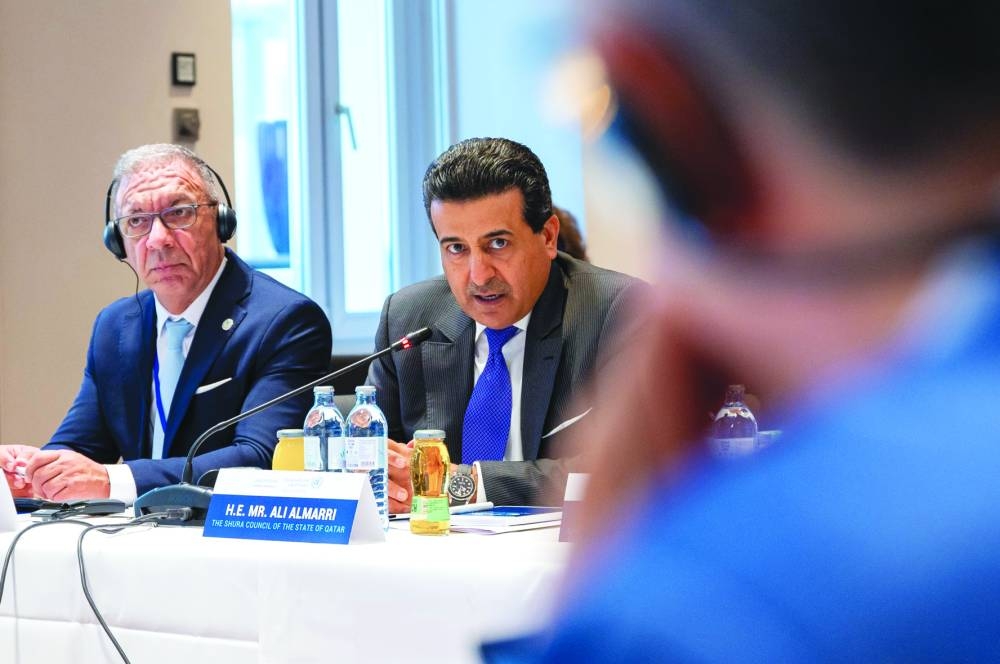The Shura Council has said that Qatar is an active partner in international efforts to combat terrorism, highlighting the support provided by the State to relevant UN agencies in confronting this issue.
This statement was made by Dr Ali bin Fetais al-Marri, a member of the Shura Council and the Chair of the Internal and External Affairs Committee, during the fourth co-ordinating meeting of parliamentary associations for counterterrorism, which began Wednesday in Vienna, Austria. The meeting is jointly organised by the Shura Council and the UN Office of Counter-Terrorism Programme on Parliamentary Engagement, based in Doha.
Dr al-Marri emphasised that Qatar has been and continues to be a major supporter of all UN efforts and principles, particularly the preservation of international peace and security. Many international, regional, and local institutions have emerged as a result of these principles.
He noted Qatar's interest in and support for efforts to combat the threat of terrorism, address its root causes, and mitigate its negative impact and spread. He mentioned Qatar's support for the UN, recognising that this global challenge cannot be effectively tackled by individual nations or international organizations alone.
Dr al-Marri emphasised that Qatar's firm belief in the effectiveness of the UN Office of Counter-Terrorism has led to both financial and political support, including hosting the office on its own soil. He added that Qatar remains confident that the ongoing and future initiatives of the UN office will make a significant impact in the fight against terrorism and extremism.
At the local level, he highlighted the legislative steps taken by Qatar to address the issue of terrorism, including the enactment of legislation aimed at combating this phenomenon. Dr al-Marri emphasized Qatar's commitment to achieving the goals of the UN and implementing its strategy, as Qatar is an active member of the organisation. He mentioned the support provided by Qatar to the UN Office of Counter-Terrorism, which amounted to $75mn.
Dr al-Marri pointed out that Qatar has not limited its efforts to financial support; it has also played an active role in mediation and peace-building endeavours. Qatar's mediation efforts have contributed to peace in Afghanistan and facilitated dialogue between the US and Iran.
He also noted that Qatar has also been involved in reconstruction projects in conflict-affected areas. It has supported development in Somalia, promoted education, and aided conflict-affected regions through international initiatives, such as the Silatech and Educate a Child programmes, aimed at minimising the impact of conflicts on children and innocent civilians.
In conclusion, Dr. Al Marri stressed the importance of the role of parliaments in combating the phenomena of terrorism and extremism, urging young and female parliamentarians to contribute actively and play their role by leading initiatives and offering promising ideas to address these issues.
The meeting aims to review the activities and initiatives implemented by parliamentary councils, including cooperation with the UN Office of Counter-Terrorism, as well as discussing priority areas and geographic focus for potential future initiatives by parliamentary associations related to counterterrorism and the prevention of violent extremism.
The agenda also included topics related to the main global and regional issues and threats related to the spread of extremism leading to terrorism, its effects on young people, and good international and regional strategies and practices in combating these dangerous scourges.
The UN Programme Office on Parliamentary Engagement in Preventing and Countering Terrorism was opened in Doha in June 2021, in accordance with the memorandum of understanding and agreement signed between the Shura Council and the UN Counter-Terrorism Office.
The office, whose activities cover all parliaments of countries around the world, seeks to facilitate the development of legislative models to activate the role of parliaments in the field of combating terrorism and preventing violent extremism.

Dr Ali bin Fetais al-Marri
